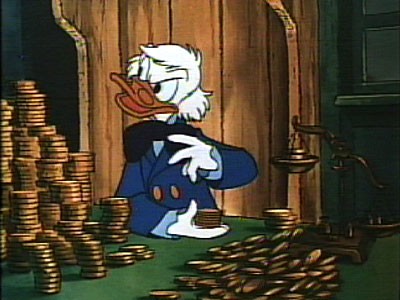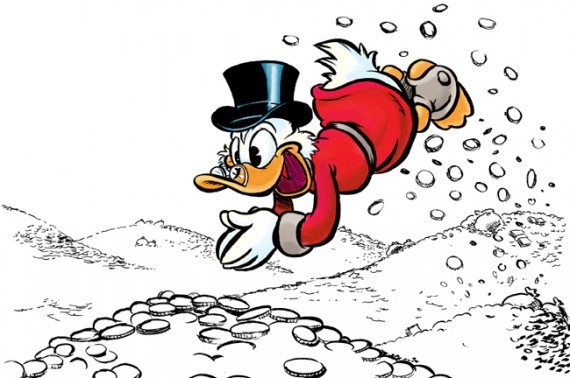Investing Lessons from Scrooge McDuck How Scrooge McDuck Can Teach You to Be a Better Investor_1
Post on: 6 Июнь, 2015 No Comment

Real Life Lessons from the Chairman of McDuck Enterprises
Hanging on the wall near the desk in one of my offices is a beautiful limited edition work called “Embarrassment of Riches” by famed comic book artist Carl Barks. In it, Scrooge McDuck, his nephew Donald, and his grand nephews Huey, Dewey, and Lewy are measuring the depths of the gold and treasurers in the money bin. As I glance up from whichever investment report happens to be in front of me at the time, I often think of the lessons that Uncle Scrooge has taught me; things that are very much a part of the enterprise that I’m building now and the way my investments are handled.
It may seem unconventional to those who don’t know me well, but it’s natural that McDuck was one of my childhood heroes. As someone born into a middle-class family, I knew that it fell to me to build a fortune if I were to ever have one; even winning the lottery had little appeal because it wouldn’t have felt earned or deserved (my parents worked extraordinarily hard and that was instilled in each of the kids ). As I studied Peter Lynch. Warren Buffett. Charlie Munger. Ben Graham. and the rest of the greats, Scrooge inevitably made his way into the integrated framework that became my investment style. It was partly the lessons I learned from him that allowed me to go from an upstart with no capital and little experience working from a library cubicle with Value Line reports, a Bic ballpoint and a pad of paper to my current situation with gold-rimmed china, fine fountain pens, and an on-demand research system that lets me monitor my commitments from the comfort of an art-filled sanctuary.
Here are some of the lessons that I learned from the Richest Duck in the World. I’m hoping they will help you build your wealth. just as they have assisted me.
Harness the Power of Trickle Back Economics
Scrooge didn’t believe in Reagan’s “trickle down” economics. He believed in something called “trickle back” economics. As one website explains the theory, “When (Scrooge) pays his nephews their wages of thirty cents an hour he knows they will use the money to buy tall, fizzy sodas at the nearest soda fountain. Then the soda fountain people will use the money to buy more fizzy ingredients at the chemical factories, and the chemical factory people will buy their ingredients from the coal tar factories — and who owns the coal tar factories? Uncle Scrooge! By the time those thirty cents have trickled back to Uncle Scrooge they have grown to sixty cents.”
In my own life, this was harnessed by creating a specialty e-commerce site that sold personalized apparel. My family owned the wholesale factory that served as one of the company’s main vendors so when we placed orders and paid for the cost of goods sold. the money was sent from the e-commerce group, which we owned, to the factory, a separate business that we also owned! To prove the value of this theory, we put aside the funds at the factory into a brokerage account where it was used to buy stocks, bonds, and mutual funds. Think of it as a company such as Berkshire Hathaway having the Nebraska Furniture Mart buy its car insurance from GEICO and selling See’s Candies inside of the store, albeit on a much smaller scale.
Study, and then Exploit, Supply and Demand Discrepancies

In one classic story, a disaster caused Uncle Scrooge’s money bin to blast wide open and shower money down on the citizens of Duckburg. Suddenly finding themselves fantastically rich, the ordinary folks gave up their day jobs and instead piled up as much treasurer as possible. The restaurants closed, the police abandoned their posts, the teachers went on vacation, and the office buildings were deserted.
Unflustered, McDuck took his now-panicked nephews (who wisely realized that the town was blowing their inheritance) to a farm on the outskirts of the city. Not understanding why Scrooge wasn’t emotional or distraught, they kept trying to impress upon their uncle the nature of the emergency. Not paying them any attention, he ordered them to help him pick up some tools and the four began sewing seeds. As time passed, the harvest began to grow and the now seemingly poor family lived on the farm.
At precisely the moment the crops were ready, the town had run out of food. Scrooge turned to his nephews and explained that he now owned the only supply of fruits, vegetables, and other foodstuffs in the area, allowing him a monopoly on goods that were necessary for survival. Able to name his price, in no time, McDuck had managed to recapture his entire fortune, while teaching the boys a priceless lesson in hard work and the exploitation of the supply and demand curve .
Warren Buffett once did this very thing in his personal portfolio by acquiring copper when the supply and demand relationships got out of balance. Later, he had Berkshire Hathaway repeat the investment when it acquired a massive portion of the world’s silver inventories.














